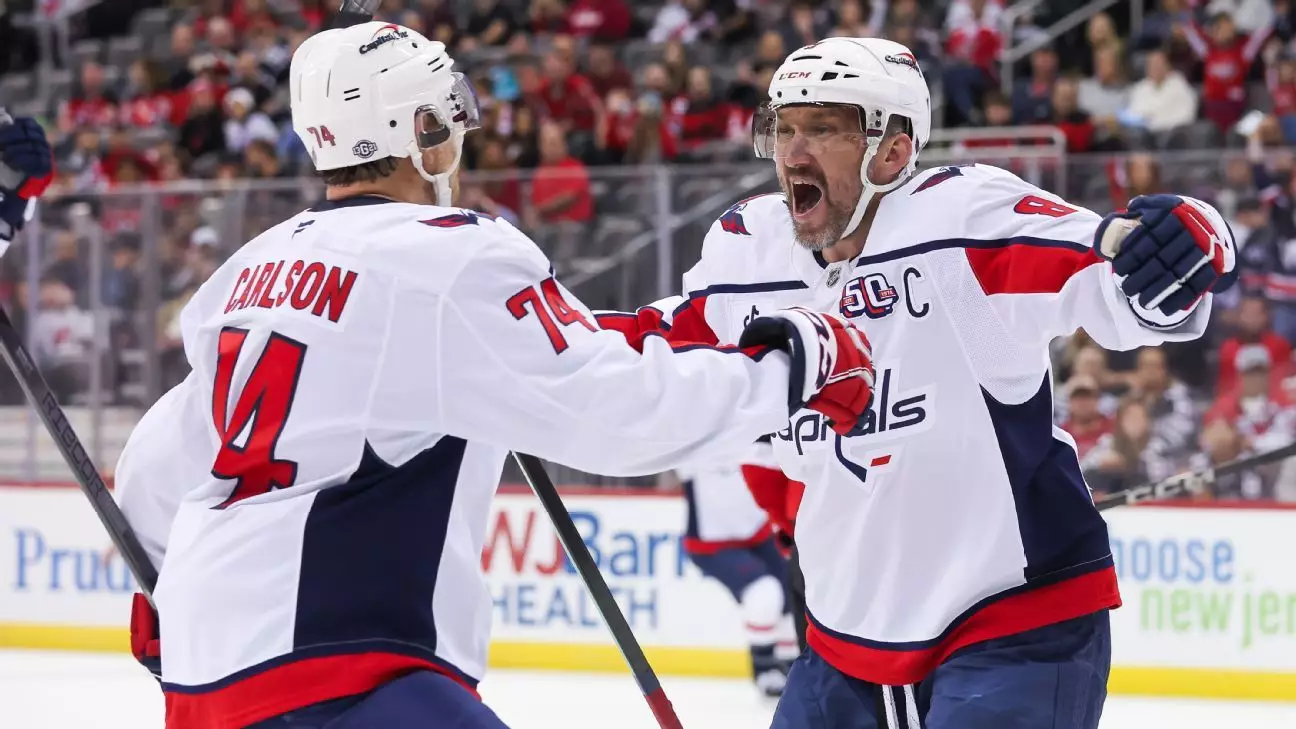The Washington Capitals are reeling from the news that their iconic captain, Alex Ovechkin, will be sidelined for a substantial period of four to six weeks due to a fractured left fibula. This injury not only halts Ovechkin’s impressive pursuit of Wayne Gretzky’s all-time goals record, a benchmark of 894 goals, but it also presents a significant challenge for the team that remains firmly in contention in the Metropolitan Division. With the regular season entering its roughly quarter-mark, this injury raises critical questions about the Capitals’ ability to maintain momentum in Ovechkin’s absence and the psychological impact on the players who have rallied around their leader.
One of the most concerning facets of Ovechkin’s injury is the psychological toll it may take on the team. Known for his remarkable durability, having missed only 35 games throughout his two-decade career, Ovechkin’s diagnosis came as a shock to both teammates and fans. Winger Tom Wilson’s reaction encapsulates the mood: “Everyone’s bummed out,” he expressed, highlighting the unprecedented nature of Ovechkin’s injury. The Capitals must navigate the dual challenge of adjusting their on-ice strategy while bolstering morale within the locker room, particularly given the emotional weight of the situation.
On the ice, the Capitals will be scrambling to fill the significant void left by their captain, who was projected to score at least 68 goals this season before his injury. As they currently sit just a point behind the Carolina Hurricanes in the division, the urgency to adapt quickly heightens. Coach Spencer Carbery will likely lean on alternate offensive lines to compensate for Ovechkin’s absence, possibly integrating Connor McMichael, Pierre-Luc Dubois, and Tom Wilson into a primary scoring unit to upend the reliance on their missing star.
However, filling the giant shoes left by Ovechkin will not come easily. While McMichael and fellow young talent Aliaksei Protas have made significant contributions—both ranking among the team’s top scorers—there’s an undeniable weight of expectation on the more seasoned members like Dubois, who, despite his strong history as a 20-goal scorer, has only found the net once this season. This lack of scoring prowess could lead to increased pressure on every line, further complicating the Capitals’ strategy against their opponents.
Ovechkin’s statistical aspirations add an extra layer of urgency to his recovery timeline. Should he return by December 20, he would have a mere 51 games left to hit his target of surpassing Gretzky, requiring an average of 0.49 goals per game. In contrast, a return on January 2 narrows his chances further to about 0.58 goals per game if he aims to reach the record this season. Given the physical demands and mental challenges associated with rehabbing a fibula fracture, notably for a player of Ovechkin’s age, the outlook is precarious.
Though there is still ample time to chase history, the path might extend into the next season if Ovechkin struggles to regain his form. Recent comparison drawn to Jake DeBrusk’s similar injury, which kept him off the ice for over six weeks, serves as a sobering reminder that recovery is rarely straightforward. The Capitals’ coaching staff will have to keep this reality in mind when plotting both short- and long-term strategies.
Beyond the gameplay changes and statistical implications lies an essential task of leadership. The Capitals’ roster now shoulders the collective responsibility to bolster not only their performance but also the emotional well-being of the team. Ovechkin’s absence leaves a tangible gap in the locker room, particularly for a squad that has been visibly inspired by his pursuit of greatness. As veteran defenseman John Carlson stated, “You never want anyone to get injured, but…he was playing his best hockey in years,” emphasizing the dual reality of losing a dynamic player—and a trusted leader.
For the Capitals, it becomes crucial to ensure that they remain a cohesive unit despite the setback. Maintaining a winning mentality will be imperative in navigating this challenging stretch of the season. The team must come together, committing to uplift one another and find new avenues for success, proving that the spirit of competition and camaraderie can endure even the most unexpected hardships.
Alex Ovechkin’s injury poses multifaceted challenges for the Washington Capitals, from the reconfiguration of their roster to the psychological and emotional dynamics within the team. As they face this crossroads, the Capitals’ ability to adapt, innovate, and inspire one another may very well define their season and ensure that Ovechkin’s pursuit of hockey immortality remains alive.


Leave a Reply